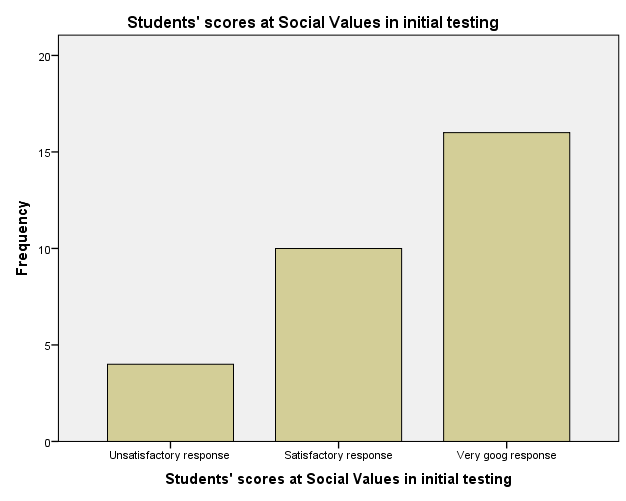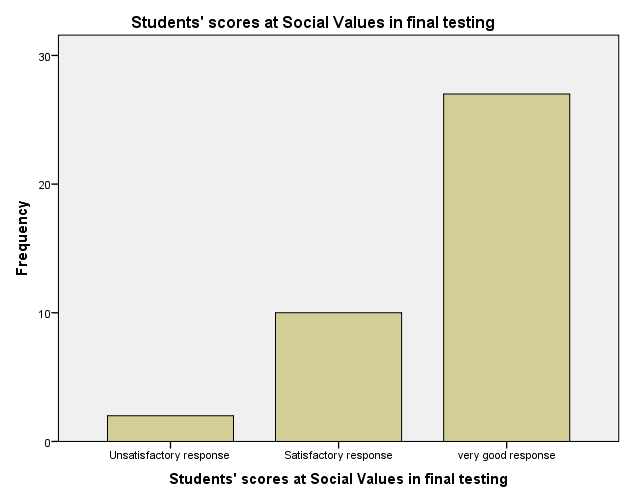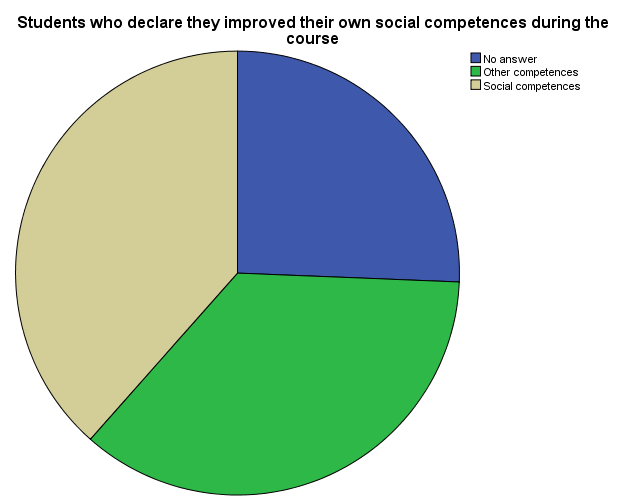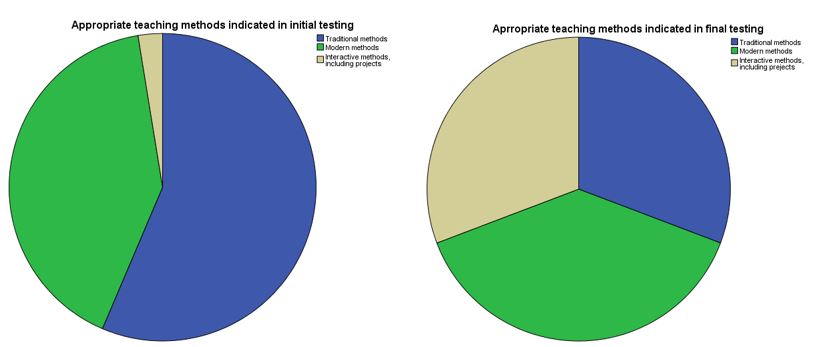Abstract
This article focuses on the analysis of social education, redesigned from the constructivist paradigm, according to the needs of the generation of digital natives and to the new social ethic of the 21st century. How could social competences be achieved in school? What kind of strategies, methods, and teacher-student relationships should be used to develop a responsible digital citizenship? A possible answer would be an interactive approach to transformative learning based on authentic experiences including students’ digital competences. Our study aims to identify the impact of teaching strategies on developing students’ social competences. The experimental research was conducted in the second semester of the academic year 2017-2018. The target population consisted in students enrolled in the final year at the Faculty of Psychology an Educational Sciences. A questionnaire regarding students’ perceptions on their own social competences was applied. The future preschool and primary school teachers chose project-based learning as the most appropriate method to teach social sciences. Our findings highlight that using constructivist teaching strategies, like authentic learning, project-based learning, role-play, has a strong impact on developing students social competences. Our results are in line with previous studies and show that well conducted interactive methods are welcome in higher education.
Keywords: Project-based learningsocial competencespostmodern school
Introduction
Social education in a digitalized society
This study focuses on the role of project method in social education field as a postmodern strategy for learning and training social competences addressed to students who are
The school as social laboratory, the teachers as promoters of new social values, the strategies of project-based learning, and experiential learning are tools for a new social ethic. An international study on civic education in Europe highlighted that all countries with a citizenship curriculum aim to develop social competences such as: effective and constructive interaction with others, prosocial behaviour, democratic action and critical thinking (European Commission, 2017). In this context, the educational landscape in Romania has been changing during the last years according to the international trends and the European recommendations. Starting with 2012, the official curriculum includes new disciplines regarding the social competence and its formation. In primary school education, Personal Development (since 2012) and Civic Education (since 2015) are involved in developing the relational abilities of pupils and in setting the desirable social interaction of future responsible citizens. In secondary education, Social Education represents the curricular frame for introducing students in Critical Thinking and Children Rights, Intercultural Education, Education for a Democratic Citizenship or Entrepreneurial Education (since 2017). The methodological suggestions of all syllabi recommend the use of project method in ordinary school activities. Therefore, it seems (as our research results) that the method of projects is not only an effective method of forming social competences, but also responds to the increasingly training needs of today's students.
Teaching social competences in postmodern school
The social competences, which are important tools for social adaptation, integration and personal development, are nowadays more important. We can make an easy experiment: we can observe during a day, how many social competences we use. We will find that we use a lot of social competences or social skills and values all day long: from daily greetings to assertive communication skills, cooperation, empathy, checking emails or chatting on the phone. We can observe that today the social competences are diversifying and becoming more complex resembling the complexity of society demands. Therefore, social competences must be redefined according to digitized, globalized and dynamic society. This is necessary for two reasons: the need to respect the values of education and to practice these values in social competences. The first reason is the need to return to the principles and values of human education. Into a complex and diversified world, we need authentic values. The UNESCO study of 2015 clearly highlights the idea of redefining education from the perspective of a humanistic approach:
Problem Statement
In recent years, educational research highlighted the benefits of social interactions not only for the well-being of the individuals, but for their learning outcomes (Goleman, 2009; Cozolino 2017; Walker 2018). In the same time, the evolution of the society in the 21st century, as an effect of globalization and digitalization, significantly modifies interacting patterns between individuals both in daily life and in the educational environment. Promoting responsible behaviours in a world where values are less obvious has its importance. The learning offer from the academic environment for the social education subject aria significantly influences the way the future preschool and primary school teachers will organize the learning situations for their own students. It becomes more important in a system searching for its new models and examples. Therefore, investigating the impact of using recognized methods, such as the project method, is legitimate.
Research Questions
Given the opportunity to teach about social education according to a newly introduced curriculum, in the digital age, we have structured our research on the following research questions and objectives:
Research questions
The questions that guided our research were:
How could social competences be achieved in school?
What kind of strategies, methods, and teacher-student relationships should be used to develop a responsible digital citizenship?
Objectives
In order to answer to these research questions we set up the following main objectives:
To identify the initial level of students regarding social competences;
To implement the formative program based on interactive teaching-learning-evaluation strategies;
To identify the impact of teaching strategies on developing students’ social competences.
Purpose of the Study
The present research aims to investigate the impact of postmodern teaching strategies on developing students’ social competences. At the beginning, we explored the students’ perception on the social values and on their own social competences. We implemented a constructivist program based on project-based learning and we evaluated students’ acquisitions by the projects they realized working in teams and respecting the pre-established criteria.
Research Methods
According to the research objectives, we selected the research methods appropriate to our design: questionnaire based inquiry and a quasi-experimental situation.
Participants
The target population consisted in the students enrolled in the third year of the Faculty of Psychology and Education Sciences, specialization Pedagogy of Preschool and School Education, namely 78 students, female (74) and male (4).
Measures
We used a self-administered questionnaire with short answers based on social values, social behaviours, and appropriate methods to teach social education. We realized a qualitative analysis of students’ answers before and after the constructivist program designed on project based learning.
Procedure
The research was carried out during the second semester of the academic year 2017-2018. After collecting the data about students’ expectations from the course and seminar, we have customized the learning situations according to the particularities of the student group. At the end of our intervention, we reapplied the evaluation procedure in order to test the differences in students’ responses. Of the 78 students enrolled, only 30 actually completed the questionnaire in initial evaluation procedure and 39 in the final. With some minor exceptions, the majority of the students have participated in more than half of the course and seminar activities.
Findings
The qualitative analysis on students’ responses in the initial evaluation indicates a medium level of their acquisitions regarding the social values. The young people consider important values in contemporary society as follows:

In the final evaluation, the level of students’ acquisition regarding the social values has been improved: 2 unsatisfactory responses, 10 satisfactory responses, and 27 very good responses (N=39; M=2,64; SD=0,58) (figure

Statistical analysis showed there are differences without statistical significance (t=-1,98; p=0,57).
Findings regarding students’ social competences
At the request to indicate the competence they perceived like being promoted during the course, 38,5% among students choose social competences, 35,9% indicated other competences, and 25,6 failed to complete the answer (figure

Findings regarding the impact of teaching strategies on developing students’ social and professional competences
In order to implement the formative program, we designed a strategy, which included interactive methods like
We have chosen as an indicator of the success of the activity the students’ perception on most appropriate methods to teach
Before the intervention, only one of the students indicated the project method as being useful for teaching

Conclusion
One of the main conclusions to be drawn is that using the project-based learning strategy is a solution for postmodern school and digital students. Nevertheless, in order to get the desired effects, a project-based learning strategy has to meet several conditions: to be design for digital native students, to be organized not only in formal context (in classroom), to promote cooperation, responsibility and other social values. The teacher have to become a learning moderator. The evaluation is also rethought in line with the project’ learning activities. Another conclusions, refers to teachers who have to assume the role of promoters of social values, from design and implementation to project evaluation. In these conditions, teachers are social models for their students. A very important model analysed from different perspectives: a human perspective, when the individual is a personal projection of values, beliefs and attitudes, and a professional perspective, when the teacher is a professional model of pedagogical conduct.
The results enhance the importance of teaching
References
- Civic education Syllabi, grades III-IV, approved by Minister’s Order No. 5003 from 02.12.2014
- Cozolino, L. (2017). Predarea bazată pe atașament. Cum să creezi o clasă tribală. [Attachment Based Teaching. How to create a tribal class.]. București: Trei.
- Finkielkraut, A. (2015). Înfrângerea gândirii. [The defeat of thinking]. București: Humanitas.
- European Commission/EACEA/, Eurydice, (2017). Citizen Education at School in Europe-2017. Eurydice Report. Luxembourg: Publications Office of European Union.
- Goleman, D. (2009). Emotional Intelligence. Why it can matter more than IQ. London: Bloomsbury Publishing.
- Hattie, J. (2014). Învățarea vizibilă. Ghid pentru profesori. [The Visible Learning. Guide for Teachers]. București: Editura Trei.
- Mezirow, J. (2014). O privire de ansamblu asupra învățării transformatoare [An Overview of Transformational Learning], în Illeris, K. Teorii contemporane ale învățării. Autori de referință [Contemporary Learning Theories. Reference authors]. București: Editura Trei.
- Ohler, JB. (2010). Digital community, digital citizen. London: Sage Publication.
- Personal Development Syllabi, preparatory class, 1st grade and 2nd grade, approved by Minister’s Order no. 3418 from 19.03.2013
- Prensky, M. (2001). Digital natives, digital immigrants. Part 1. On the Horizon, 9(5), 1-6. https://doi.org/10.1108/10748120110424816
- Robinson, K; Aronca, L. (2015). Școli creative. Revoluția de la baza învățământului. [Creative schools. The revolution at the basis of education]. București: Publica
- Senge, P. (2016). Școli care învață. A cincea disicplină aplicată în educație [Schools that learn. A Fifth Subject Matter Applied in Education]. București: Editura Trei
- Social education Syllabi, grades V-VIII, approved by Minister’s Order No. 3393 from 28.02.2017
- Stolovitch, D.H. & Keeps J.E. (2017). Formarea prin transfomare. Dincolo de prelegeri [Transformation training]. Beyond lectures). București: Editura Trei.
- Siebert, H. (2001). Pedagogie constructivistă (Constructivist pedagogy). Iaşi: Ed. Institutul European.
- Ulrich, C. (2016). Învățarea prin proiecte. Ghid pentru profesori. [Learning through projects. Guide for teachers]. Iași: Polirom
- Usher, R. (2014). Experiență, pedagogie și practici sociale. în Illeris K (coord) Teorii contemporane ale învățării. Autori de referință. [Experience, pedagogy and social practice in Illeris K (coord) Contemporary theories of learning. Reference authors]. București: Editura Trei
- Walker, T.D. (2018) Să predăm ca în Finlanda. 33 de strategii simple pentru lecții de bună-dispoziție. [Teach like Finland: 33 Simple Strategies for Joyful Classrooms]. Bucuresti: Editura Trei
- Veen, W.; Vrakking, B. (2011). Homo zappiens. Joc și învățare în epoca digital. [Homo zappiens. Playing and learning in the digital age]. București: Editura Sigma
- UNESCO. (2015). Rethinking Education. Towards a global common good? Paris:UNESCO.
Copyright information

This work is licensed under a Creative Commons Attribution-NonCommercial-NoDerivatives 4.0 International License.
About this article
Publication Date
15 August 2019
Article Doi
eBook ISBN
978-1-80296-066-2
Publisher
Future Academy
Volume
67
Print ISBN (optional)
-
Edition Number
1st Edition
Pages
1-2235
Subjects
Educational strategies,teacher education, educational policy, organization of education, management of education, teacher training
Cite this article as:
Voinea, M., & Turculeț*, A. (2019). Teaching Strategies Of Social Competences In Postmodern School. In E. Soare, & C. Langa (Eds.), Education Facing Contemporary World Issues, vol 67. European Proceedings of Social and Behavioural Sciences (pp. 655-664). Future Academy. https://doi.org/10.15405/epsbs.2019.08.03.78
